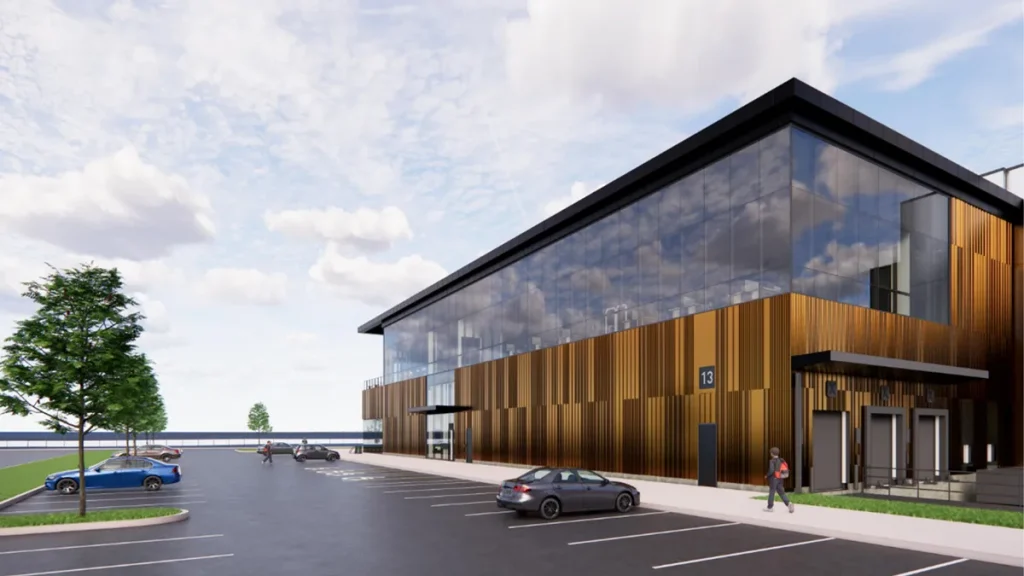• Meta begins using mass timber on U.S. data center campuses to cut embodied carbon in building materials by approximately 41% for substituted materials, with pilots in South Carolina and projects launching in Wyoming and Alabama.
• The company plans to expand mass timber beyond administrative buildings to warehouses and critical data halls, complementing efforts on near-zero-emissions steel and low-carbon concrete as it targets net zero emissions across its value chain by 2030.
• Prefabricated timber can shorten construction by weeks, reduce foundation concrete volumes by up to half, provide reliable fire resistance and high strength-to-weight performance, and support biophilic design benefits for on-site staff.
Meta is piloting mass timber to reduce the embodied carbon of new data center construction as part of its strategy to achieve net zero emissions across its value chain by 2030. The company notes that reducing construction emissions requires lower-carbon alternatives to conventional materials like concrete and structural steel. Meta is pursuing near-zero-emissions steel through membership in RMI’s Sustainable Steel Buyers Platform and has already piloted multiple approaches to advance low-carbon concrete in its data centers.
Mass timber refers to engineered wood products—such as glue-laminated beams and columns (glulam), mass plywood, timber wall assemblies, and cross-laminated timber (CLT), which consists of thickly sawn lumber glued with alternating grain directions at 90º. These products are designed for industrial applications, including data centers and even high-rise buildings, and offer lower embodied carbon than many engineered materials because sustainably sourced, bio-based materials store carbon sequestered during growth.
In 2025, Meta began piloting mass timber across its data center campuses. The first mass timber administrative building was erected at the Aiken, South Carolina, data center campus by DPR using materials from SmartLam. Later in 2025, Meta will start additional mass timber buildings at its Cheyenne, Wyoming, site with Fortis Construction and Mercer Mass Timber, and at its Montgomery, Alabama, site with Hensel Phelps and Binderholz. Looking ahead, Meta will incorporate mass timber into additional administrative buildings, warehouses, and the critical data halls that house the servers powering its platforms.
RELATED ARTICLE: Meta To Buy Green Credits from Four Major US Solar Energy Projects
Meta estimates that incorporating mass timber in its administrative buildings reduces the embodied carbon of substituted materials by approximately 41%. Because mass timber products are largely prefabricated, they reduce the need for on-site steel welding, can accelerate schedules by several weeks, and eliminate emissions associated with typical construction processes. Their lighter weight compared with steel can also cut foundation concrete requirements—by half in some cases—lowering both cost and emissions from concrete pouring.
Mass timber can be engineered with a higher strength-to-weight ratio than steel, making it a strong and suitable option for data centers. Its density and predictable char layer provide reliable fire resistance, and elements can be pre-insulated or pre-assembled for roofs, walls, and other applications. Research indicates that biophilic designs featuring exposed mass timber help occupants feel connected to nature, reducing stress, boosting morale, increasing productivity, and fostering wellness for operations and facilities staff.
Meta’s approach requires third-party audits to ensure timber is responsibly sourced and milled. Wood must be transparently traceable to its forest of origin, with forests managed for long-term ecological health and social impact, including safe working conditions and fair wages in local communities. Where structural integrity allows, manufacturers may also use reclaimed wood salvaged from buildings or other sources. Sustainable timber operations can complement conservation in sourcing regions, and Meta prioritizes suppliers committed to climate-smart forestry—such as wildfire risk reduction, partnerships with tribes managing forestlands, and practices that improve carbon storage and ecological health through restoration and conservation.
Meta is already supporting sustainable forestry through partners that remove residual emissions on its path to net zero, including BTG Pactual Timberland Investment Group in Brazil and EFM in Washington State. These projects support people and nature beyond emissions goals and help ensure a sustainable timber supply for mass timber and other markets.
Because the emissions from sustainably harvesting, milling, and manufacturing timber are typically far lower than those from producing steel and concrete, scaling low-carbon materials like mass timber is critical to a net zero future. Meta’s pilot buildings are intended to demonstrate new approaches for accelerating the transition and to invite industry peers to learn from and support evolving, lower-carbon construction methods for the data centers of tomorrow.
Follow ESG News on LinkedIn

